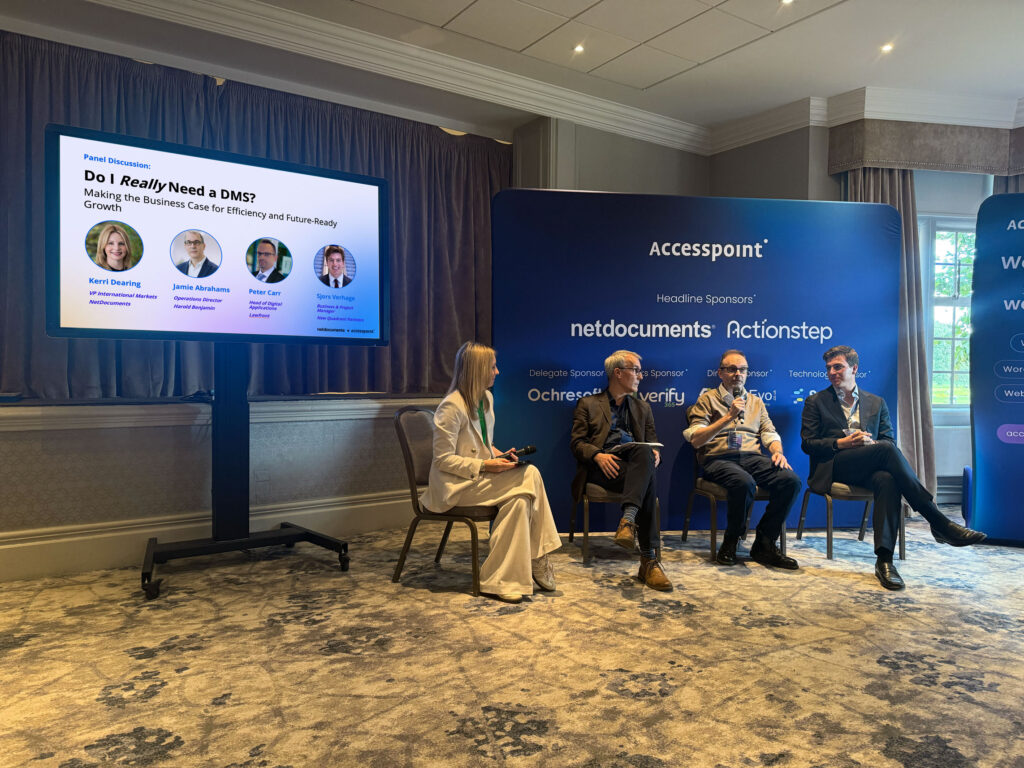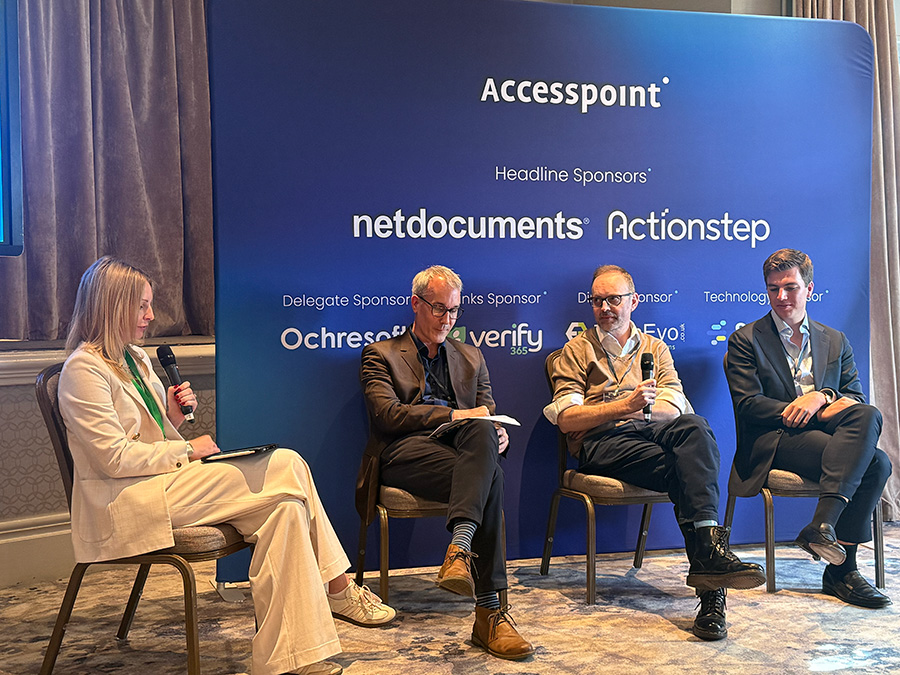Do I really need a DMS? | Accesspoint
In today’s evolving legal tech landscape, one question continues to surface for many firms: Do we really need a Document Management System (DMS)? To delve into this, NetDocuments hosted a panel at this year’s Innovators Forum, alongside Accesspoint’s clients: Harold Benjamin, Lawfront and New Quadrant Partners.
Do I really need a DMS? A panel discussion with NetDocuments and Accesspoint’s clients.
At our 2025 Innovators Forum, Kerri Dearing, VP of International Markets at NetDocuments lead an engaging discussion with law firm leaders who have confidently answered that question. Together, they explore the tangible business value of adopting a modern DMS. From leveraging cloud-first flexibility and enabling seamless PMS integration, to improving efficiency, compliance, and collaboration, this session at our Innovators Event unpacked how a DMS helps firms stay competitive and future-ready.
Expect honest insights, practical takeaways, and real-world lessons to help you assess whether your firm can afford not to have a DMS.

Hear the answers from our panellists on the day
In the below transcription, we address some of the key take aways from the panel. Our panellists discuss their reasons for adopting NetDocuments within their firm and provide valuable advice and insights to other firms that are considering the question: do I really need a DMS?
How did you go about getting buy in from the stakeholders and bringing them along on the journey at your firm?
Sjors Verhage, New Quadrant Partners
Read Sjors’s answer below…
“I think first of all it was trying to convince our colleagues that we do need such a system and why we need this system. So that’s step number one. And of course, there’s also a financial case to present to the leadership team and collecting those arguments together. But also showing your colleagues what you would give back to them. It’s not okay to just throw technology at them and say ‘you use this from this day going forward’. That’s not a solution. So I think it’s both making a business case to your colleagues and the leadership team.”
Jamie Abrahams, Harold Benjamin
Read Jamie’s answer below…
Integrations were really important for Jamie at Harold Benjamin when considering a successful roll out of NetDocuments, as well as working with the right partner. So Kerri invited Jamie to tell the audience about how they went about this at their firm:
“Integrations were really important to us because we had quite a lot of data that we wanted to migrate, and we felt that we couldn’t do DMS and PCMS in one go because it would’ve been too disruptive. You hear the expression ‘business as usual’ a lot; this means not interrupting lawyers at all and not wasting any of their time. Anything that falls short of that would been problematic, so we had to keep everything running all the time and there was never going to be a good time to do it.
Our instance of NetDocuments is linked to our current PCMS as a bi-directional integration. It does a lot of the stuff that otherwise you’d have to train people to do. We open a file in DMS, it opens the right content according to case types and other criteria. It can push through our existing PCMS’s scripting such as agendas, documents and things like that, and create them in NetDocs which is useful. It saves hours of work and training by automating those processes.
It is not widely known that we did a pilot project with an Integration partner, and it didn’t work out, so we did have two attempts at this. I’d love to say I had this all planned out and that it was perfect but on the first go it wasn’t successful. When we re-started the project, we realised almost everything that was in the initial training we could pretty much code out with a good bi-directional integration. That’s why it really worked for us. You try and get it perfect but things do come up when you go live. It’s important to work with the right implementation partner who were able to react quickly to these needs and minimise disruption.”
What impact have you seen since adopting NetDocuments?
Sjors Verhage, New Quadrant Partners
Read Sjors’s answer below…
“Time saving. I think everyone here in this room wants to focus on ‘How can I make my lawyers and fee earners spend as much time as possible making money and less time looking for documents?’ Because that’s not chargeable time.
When we went live with NetDocuments we integrated it with Clio which is also a cloud-based PMS. The integration was very important to us. Luckily for us when we generate a document in Clio, put all client data on that form (which is what it can do for us), it mirrors straight into NetDocs into the matter. So giving fee earners the ease to not move documents around and also to be able to look for documents in seconds rather than a few minutes is a huge time saver.”
Peter Carr, Lawfront, Read Peter’s answer below…
“Lawfront’s IT landscape is inherently complex, shaped by an ambitious M&A growth strategy. Our DMS deployment sits within a broader PMS and CMS modernisation programme, designed to deliver a single, integrated platform for over 1,200+ colleagues. One of the quickest wins with NetDocuments has been rolling it out to central functions like Professional Standards and People and Culture. These teams benefit immediately from a shared, centralised resource, enabling standardisation and peer review across the group. Beyond compliance, it’s proving to be a powerful collaboration tool.”
So to answer… do I really need a DMS?
Peter Carr, Lawfront
Read Peter’s answer below…
“You don’t need a DMS if you can answer ‘Yes!’ to all of the below. So have a think about what you really want out of your documents:
- Do you trust people to file documents correctly?
- Do you trust that staff can find content quickly when they need them?
- Do you trust that they’ll pass on that knowledge when they retire?
- Do you trust your documents are stored securely, available 24/7, with a full audit trail?
If you don’t, then you need a DMS.”
Sjors Verhage, New Quadrant Partners
Read Sjors’s answer below…
“I would agree. Don’t cheap out on it. It can cost you more money than it costs per year. Really see the added value of Document Management Systems. I think giving your fee earners the ability to find documents in an easy way is really powerful, even if you might trust someone to store them in the right way. So I’ll emphasise again, don’t cheap out.”
Jamie Abrahams, Harold Benjamin
Read Jamie’s answer below…
“I think the last few years have been a really difficult place for IT Directors because you’ve got an infrastructure which is not built around cloud technology and probably works OK and you have to try and explain that to the owners of the business who are probably going to say ‘Why can’t we just stay the same?’. Around 50% of our reasoning behind DMS was to future-proof the infrastructure and move it to native cloud applications. Once this is done, it then makes it much easier to connect to other software solutions and provides more opportunities to the business and supports our expansion.”

To conclude…
Consider everything our panellists have mentioned in the above. Really think about your firm’s efficiencies, time savings and potential future infrastructure changes. With a DMS in place, lawyers and staff can focus less on chasing down files and more on serving clients, which ultimately makes your firm run smoother and smarter.
We hope this article has proved helpful in helping you assess whether your firm can afford not to have a DMS.






